Navigating Geopolitical Challenges with China-Europe Road Transport Solutions
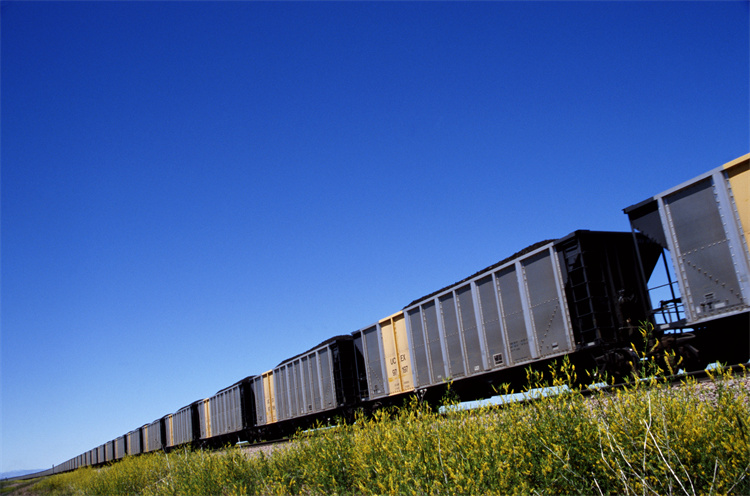
Global trade relies heavily on reliable logistics, and China-Europe road transport plays a pivotal role in keeping supply chains intact. For instance, rail freight volumes between these regions shot up by 130% year-on-year, with shipments reaching 330,700 TEU from China to Europe. Businesses facing geopolitical challenges are turning to flexible solutions, like combining road, rail, and sea transport. This adaptability not only mitigates risks but also ensures operations remain resilient against disruptions. Companies now see adaptive logistics as essential for navigating market shifts and unexpected events.
Key Takeaways
Flexible shipping is important when dealing with global problems. Using trucks, trains, and ships keeps deliveries on track.
Using different transport types lowers risks. Businesses can quickly adjust by choosing other routes or ways to ship items.
Tracking shipments in real-time with tools like JUSDA’s JusLink helps. Companies can see where goods are and handle delays better.
Working closely with shipping experts makes things more reliable. Partnering with companies like JUSDA improves shipping and speeds up customs checks.
Understanding Geopolitical Shifts and Their Impact on Logistics
Key geopolitical events reshaping global trade routes
Geopolitical events have always influenced global trade, but recent years have seen unprecedented shifts. The US-China tariff war, starting in 2018, disrupted trade flows and led to increased costs for businesses worldwide. Similarly, Russia's invasion of Ukraine caused significant supply chain disruptions, particularly in energy and agricultural sectors. These events have pushed countries to adopt "friend-shoring," where trade occurs primarily between allied nations. This shift has reduced trade between rival countries, altering traditional trade routes.
Another major factor is China's Belt and Road Initiative (BRI). Since its official launch in 2013, the BRI has expanded to over 75 countries, reshaping global trade corridors. By securing port contracts and developing infrastructure, China has created new opportunities for trade. These geopolitical developments highlight the need for businesses to rethink their logistics strategies.
Challenges faced by businesses in maintaining supply chain continuity
Geopolitical tensions create hurdles for businesses trying to maintain smooth supply chains. Trade restrictions, such as tariffs and sanctions, increase costs and delay shipments. Conflicts like those in Ukraine and the Middle East disrupt transportation routes, forcing companies to find alternatives. Additionally, varying customs regulations across regions add complexity to cross-border logistics.
For businesses relying on China-Europe Road Transport, these challenges emphasize the importance of flexibility. Companies must adapt quickly to changing conditions to avoid disruptions. Without proactive strategies, supply chains risk becoming inefficient and costly.
The growing importance of adaptable transport solutions
Adaptable transport solutions have become essential in today’s volatile environment. Studies show that flexible logistics systems help businesses overcome barriers caused by geopolitical events. For example, combining road, rail, and sea transport allows companies to navigate disruptions effectively. Data-driven decision-making also plays a crucial role, enabling businesses to respond quickly to unexpected changes.
China-Europe Road Transport exemplifies this adaptability. By integrating road and rail networks, businesses can ensure reliable delivery even during geopolitical crises. This approach not only minimizes risks but also enhances operational efficiency, making it a vital strategy for global trade.
Flexible Transport Solutions: The China-Europe Express Rail Advantage
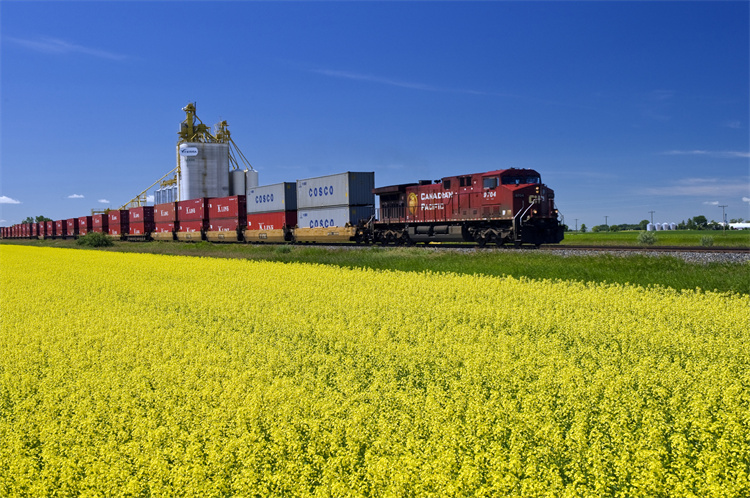
How the China-Europe Express Rail complements road transport
The China-Europe Express Rail has become a game-changer in global logistics, especially when paired with road transport. Together, they create a seamless intermodal system that enhances efficiency and reliability. For instance, rail transport handles long-distance bulk shipments, while road transport ensures last-mile delivery. This combination reduces transit times and improves supply chain flexibility.
A closer look at performance metrics highlights this synergy.
Metric | 2017 Value | 2023 Value | Change |
|---|---|---|---|
National railway freight volume | 7.8% | +1.4% | |
Waterway freight volume | 14.1% | 17.1% | +3.0% |
Road freight volume | 78% | 73.7% | -4.3% |
Container rail-water intermodal | N/A | 10.1836 million TEUs | N/A |
Total trains operated by China-Europe Railway Express | N/A | 17,500 | N/A |
These figures show how rail transport is gaining traction, complementing road transport to meet growing demand.
Key features and benefits of the China-Europe Express Rail
The China-Europe Express Rail offers several standout features that make it a preferred choice for businesses. Its transit time of 12-16 days is significantly faster than maritime shipping, which takes 30-45 days. This speed is ideal for time-sensitive goods like electronics and medical supplies. Additionally, the rail network has transported over 50,000 types of goods, including machinery and automobiles, showcasing its versatility.
Businesses also benefit from its cost-effectiveness. Rail transport is more affordable than air freight and provides a greener alternative, reducing carbon emissions by 30%. The trade volume between China and 25 European countries reached 7.42 trillion yuan in 2022, up from 4 trillion yuan in 2013. This growth underscores the rail network's role in boosting intercontinental trade.
JUSDA’s role in optimizing intermodal logistics for businesses
JUSDA plays a pivotal role in helping businesses leverage the full potential of the China-Europe Express Rail. By integrating road, rail, and even sea transport, JUSDA ensures smooth operations across borders. Its expertise in customs coordination minimizes delays, while its JusLink platform provides real-time tracking for enhanced visibility.
For example, JUSDA’s intermodal solutions connect Southeast Asian markets to Europe via Chinese railway channels. This approach not only expands market reach but also optimizes costs. With over 155 service points worldwide, JUSDA delivers tailored logistics solutions that align with the unique needs of various industries.
Tip: Businesses looking to enhance their supply chain resilience should consider JUSDA’s intermodal logistics services. They combine speed, cost-efficiency, and reliability to navigate today’s complex trade environment.
Key Routes and Corridors for China-Europe Road Transport
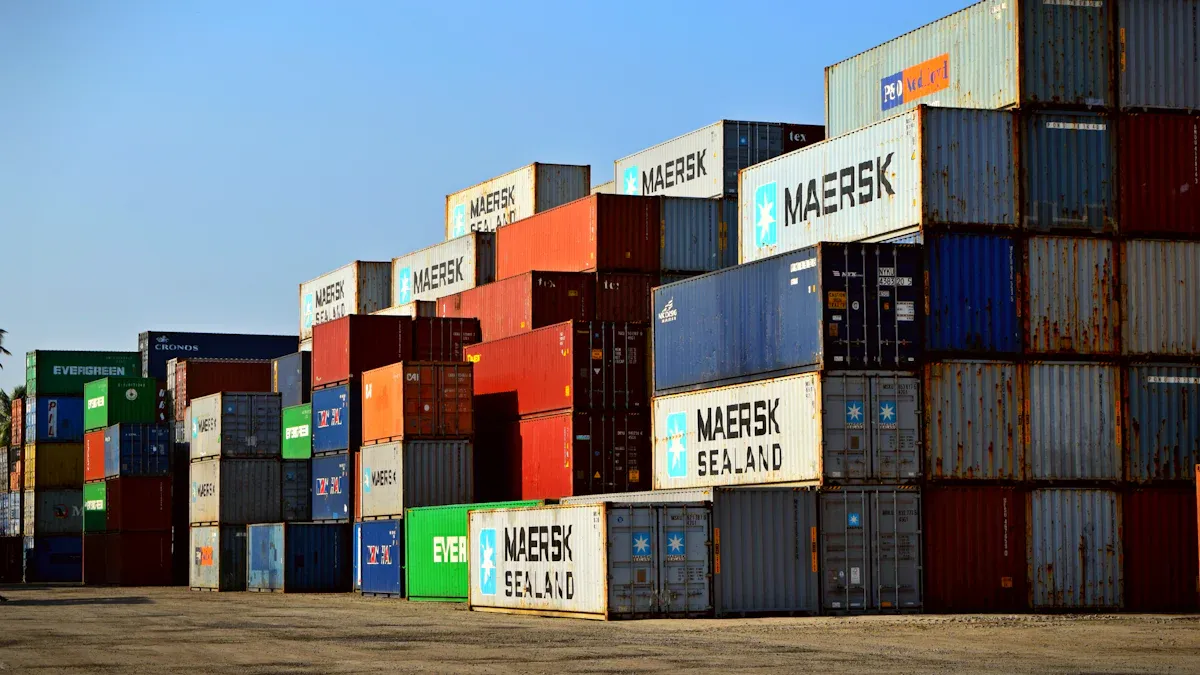
Overview of major road and rail corridors
China-Europe logistics rely on a network of vital road and rail corridors that connect key regions. These corridors ensure smooth transportation of goods across vast distances. Major rail routes include Chongqing to Duisburg, Wuhan to Duisburg, and Zhengzhou to Hamburg. These routes form the backbone of the China-Europe transport network, linking industrial hubs in China to major European cities.
The rail corridors operate on different gauge types, requiring seamless transitions at key locations. For example:
Route Description | Gauge Type | Key Locations |
|---|---|---|
China to Kazakhstan | UIC gauge (1435 mm) | Dostyk |
Kazakhstan to Belarus | Russian broad gauge | Brest |
Poland to Germany | Standard gauge | Duisburg |
This extensive network connects 226 cities in 25 European countries and over 100 cities in 11 Asian countries. The Gefco Group has also expanded its rail services, enhancing connectivity between Europe, Russia, Central Asia, and China.
The Middle Corridor and its strategic importance
The Middle Corridor has emerged as a critical alternative for China-Europe transport. This route bypasses traditional paths through Russia, offering a shorter and more efficient connection. A test rail shipment from China to Baku, Azerbaijan, demonstrated the corridor's viability, reducing transit times from 50 days to just 11 days.
Significant investments from countries like Azerbaijan and Kazakhstan have bolstered the corridor's capacity. By 2030, the goal is to handle 11 million tons of cargo annually. In 2023 alone, cargo volumes reached 2 million tons in the first nine months, nearly doubling from 2022. Ports like Aktau and Kuryk in Kazakhstan have also seen rapid growth, handling 2.5 million tons of goods by December 2023.
This corridor not only enhances connectivity but also provides a reliable alternative during geopolitical disruptions, ensuring the continuity of China-Europe Road Transport.
Ensuring reliability and capacity in transport routes
Reliability and capacity are crucial for the success of China-Europe logistics. The China Railway Express has shown remarkable growth, with 14,689 round trips in 2024, a 13% year-on-year increase. These trips transported 1.57 million TEU of goods, reflecting the system's efficiency.
Performance metrics further validate the reliability of these routes:
Metric | Value |
|---|---|
Freight Trips | 2,928 |
TEUs Transported | 317,000 |
Growth in Freight Trips | 9% |
Growth in TEUs Transported | 10% |
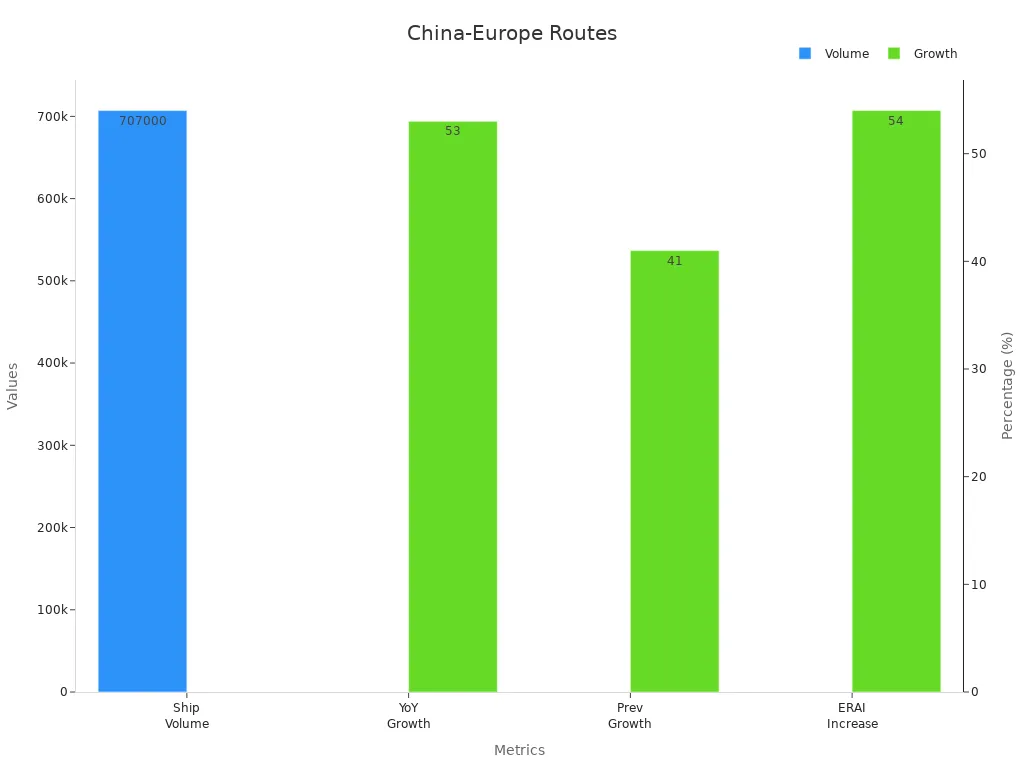
These figures highlight the growing demand for reliable transport solutions. By leveraging advanced logistics platforms like JUSDA’s JusLink, businesses can track shipments in real-time and optimize their supply chains. This ensures that China-Europe Road Transport remains a dependable option for global trade.
Strategies for Businesses to Optimize Logistics Amid Geopolitical Shifts
Diversifying transport modes to enhance resilience
Businesses today face unpredictable geopolitical challenges that can disrupt supply chains. Diversifying transport modes is a proven strategy to build resilience. By combining road, rail, and sea transport, companies can mitigate risks and ensure continuity. For instance, when one route faces delays, alternative modes can step in to keep goods moving. This approach not only reduces dependency on a single mode but also enhances flexibility.
Recent data highlights the importance of such strategies. The average lead time for shipments peaked at 100 days in July 2022 but dropped to 79 days by April 2024, thanks to improved logistics planning. Companies are also increasing inventories and adopting automation to cope with disruptions.
Metric | Value |
|---|---|
Average lead time (April 2024) | 79 days |
Peak lead time (July 2022) | 100 days |
Average lead time (2019) | 65 days |
Manufacturing Supplier Deliveries Index (April 2024) | 48.9 |
Manufacturing Supplier Deliveries Index (December 2023) | 47 |
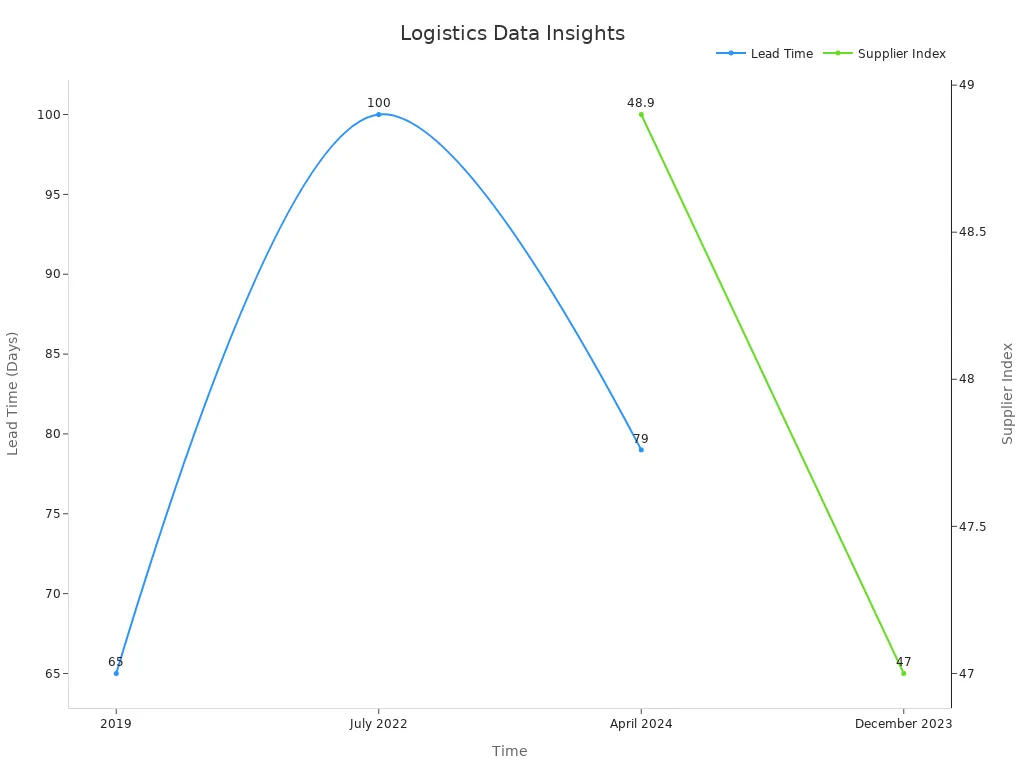
This data underscores the value of diversifying transport modes to navigate disruptions effectively.
Leveraging JUSDA’s JusLink platform for real-time tracking and planning
Real-time tracking has become a game-changer in logistics. JUSDA’s JusLink platform offers businesses the ability to monitor shipments across multiple modes, including China-Europe Road Transport. This transparency allows companies to make informed decisions quickly. For example, if a shipment faces delays at customs, JusLink provides updates in real time, enabling businesses to adjust their plans.
The platform also integrates advanced technologies like IoT and big data. These tools enhance end-to-end visibility, ensuring that businesses can track goods from origin to destination. Improved visibility reduces inefficiencies and helps companies respond to unexpected challenges. By leveraging JusLink, businesses can optimize their logistics and maintain smooth operations even during geopolitical uncertainties.
Building partnerships with trusted logistics providers like JUSDA
Strong partnerships are the backbone of a resilient supply chain. Collaborating with trusted providers like JUSDA ensures reliability and efficiency. JUSDA’s expertise in intermodal logistics, customs coordination, and real-time tracking makes it an ideal partner for businesses navigating complex trade environments.
Trust, communication, and transparency are key elements of successful partnerships. Sharing real-time data fosters accountability and alignment, while clear communication prevents misunderstandings.
Evidence Type | Description |
|---|---|
Trust | Reliability over time strengthens trust among supply chain partners, essential for continuity. |
Communication | Clear and timely communication fosters collaboration and prevents misunderstandings, aiding continuity. |
Transparency | Sharing real-time data promotes accountability and alignment, making the supply chain more efficient. |
By partnering with JUSDA, businesses can access tailored solutions that align with their unique needs. This collaboration not only enhances efficiency but also ensures supply chain continuity in the face of geopolitical challenges.
Flexible logistics solutions like China-Europe Road Transport have become indispensable in today’s unpredictable trade environment. They provide businesses with the adaptability needed to overcome disruptions and maintain supply chain continuity. JUSDA, with its expertise in intermodal logistics and the China-Europe Express Rail, empowers companies to navigate geopolitical challenges effectively. By offering faster transit times and cost-efficient options, these solutions ensure businesses stay competitive.
Looking ahead, the role of road transport in global trade will continue to evolve. Projections show rising demand for freight trains by March 2025, driven by growing manufacturing and exports. Rail networks are set to expand, connecting more European cities and improving efficiency through digitization. With transit times of just 12-18 days, rail freight will remain a vital component of flexible logistics strategies.
FAQ
1. What makes China-Europe road transport a reliable option for businesses?
China-Europe road transport offers flexibility and speed. It ensures goods reach their destination even during disruptions. By combining road and rail, businesses can enjoy faster transit times and cost-effective solutions. This adaptability makes it a dependable choice for global trade.
2. How does JUSDA ensure smooth customs operations?
JUSDA uses its extensive network and expertise to simplify customs processes. Its team handles documentation, compliance, and coordination across borders. This reduces delays and ensures goods move seamlessly through checkpoints, saving businesses time and money.
Tip: Partnering with JUSDA can help businesses avoid common customs-related challenges.
3. Can small businesses benefit from JUSDA’s logistics solutions?
Absolutely! JUSDA tailors its services to meet the needs of businesses of all sizes. Small businesses can leverage cost-effective options like the China-Europe Express Rail and JusLink platform for real-time tracking. These tools enhance efficiency and reduce logistics costs.
4. What industries can use the China-Europe Express Rail?
The China-Europe Express Rail supports diverse industries, including electronics, automotive, FMCG, and medical supplies. Its ability to handle various goods makes it a versatile solution for businesses looking to optimize their supply chains.
5. How does JusLink improve supply chain visibility?
JusLink integrates IoT and big data to provide real-time tracking. Businesses can monitor shipments, predict delays, and adjust plans instantly. This transparency enhances decision-making and ensures smooth operations, even during unexpected disruptions.
Emoji Insight: 📦 Real-time tracking means fewer surprises and more control over your shipments!
See Also
Addressing Global Supply Chain Growth Challenges Effectively
Revealing Innovative Approaches to Cross-Border Supplier Partnerships
Get Prepared: Discovering New Transport Tech for Supply Chains
